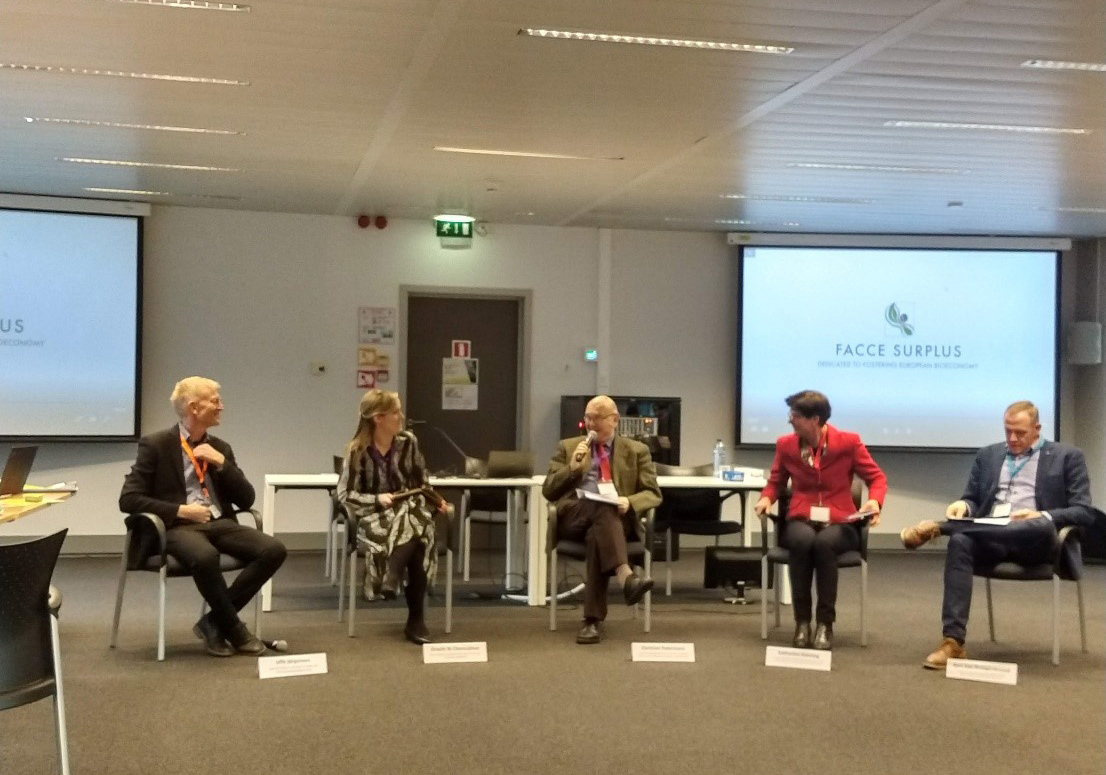Technologies for a more sustainable Europe
We have significant technological knowledge to develop the bioeconomy, but we need incentives for farmers and the industry to turn research into business. This was one of the main conclusions of the discussion at the FACCE SURPLUS final conference in Brussels. The discussion was moderated by Christian Patermann who has followed the development of the bioeconomy policy since he participated in formulating the first Commission policies early this century.

A panel of five experts were invited at the FACCE SURPLUS final conference to discuss the future of bioeconomy in Europe – and there were several points on the opportunities and obstacles of the bioeconomy that they could agree on.
We know what to do
There was common agreement that significant technical knowledge has been created, which makes a further development of the bioeconomy possible. One of the panellists, Uffe Jørgensen, Senior Researcher and leader of the Centre of Circular Bioeconomy at Aarhus University, stated:
- We know what to do. We have had the technologies to turn sugar beets into sugar and potato into potato starch for ages. Now we need to convert other biological resources into new products and we need to develop the technology further. It is not that difficult - it is just hard work, he said and continued:
- We have harvested the lowest hanging fruits of the bioeconomy. A lot of incremental innovation has happened, but now there is a need for disruptive technology circles, if we want to overcome the challenges related to a sustainable development.
Panelist Katharina Helming, Co-chair of research synthesis programme area, Leibniz Centre for Agricultural Landscape Research (ZALF), stressed the importance of the knowledge generated within the framework of FACCE SURPLUS:
- FACCE is highly advanced in terms of interdisciplinary and integrated research compared to the national projects that I know of. This is a necessity when it comes to finding solutions that can lead to a sustainable development by integrating the research results in concrete new activities. The research of FACCE has given us a vision of where to go to, and it has helped to understand what we need to do and what we need to achieve.
We need incentives to do it
The panelists also agreed that incentives for farmers and industries to turn bioeconomy research into business are the key to realizing the great potentials of the bioeconomy. Currently, the economic actors are not rewarded for reducing their environmental impact, and therefore policy-making with respect to carbon credits on farmland, carbon taxes etc. could be considered. During the discussion, there was also a message on the need to improve start-up conditions for SMEs that are instrumental in initiating new businesses on the bioeconomy.
Panelist Bart Van Droogenbroeck, Senior researcher, Research Institute for Agriculture, Fisheries and Food (ILVO) stated:
- We need radical innovations, but as long as sustainability is not rewarded, it will be difficult to get farmers onboard. Many farms are one-man businesses, and even though they might want to change their production, they might consider this risky. We need to overcome this barrier, because in the end, these one-man companies are the ones who have to produce the biomass for the bioeconomy of the future. We need to earn their trust, and we need to offer them incentives. There are many opportunities, but also many obstacles out there.
The panel discussion included wishes to better governance on product claims, traceability, agro-integration with digitalisation, consumer-involvements and research in new business constructions and the possible incentive structures. It was recommended for the European Commission to revisit the Novel Food Regulation, which - due to its complexity – can be an obstacle for companies with new product ideas – especially the smaller companies. The need for overall strategies and implementation plans for closing the protein gap were furthermore addressed.
Panelist Órlaith Ní Choncubhair, Policy Officer, Bioeconomy and Food Systems Unit, DG Research & Innovation, European Commission, stated:
- The bioeconomy is key to comprehensively tackling how we produce, process and consume biomass, organise our economy and simultaneously address multiple policy goals. We cannot go on with business as usual, and now there is a high degree of political will to promote the bioeconomiy agenda and its holistic approach to sustainability within the context of the European Green Deal.
